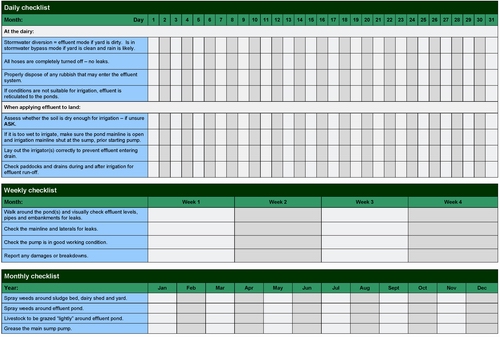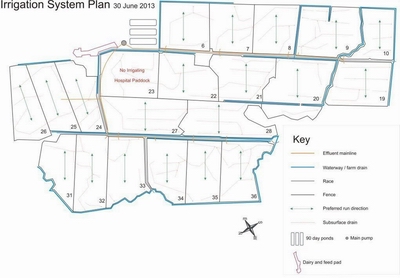Managing wastewater
Farm systems must be managed as a whole, and procedures put in place for routine checking and maintenance.
Some farmers have implemented effluent management plans which include:
- Ongoing staff training
- Documented operating and maintenance procedures
- Checklists of individual tasks with due dates – signed off once completed
- Irrigator runs clearly marked on farm maps.
All pipework, sumps, pumps, ponds, irrigators and other components of the system must be regularly checked and maintained.
Find information on land application
Daily checklist - example Farm irrigation map - example
Wastewater storage
High rainfall events are common in Northland, with soils often saturated from May through to October. It is therefore strongly recommended that, at a minimum, enough storage is provided to hold all wastewater generated over that period, based on average local rainfall.
Wastewater volumes
One of the most cost-effective ways to improve wastewater management is to reduce wastewater volumes.
Wastewater volumes are affected by:
- Water use efficiency
- Cow flow and stockmanship
- Infrastructure design
- Stormwater management
Find more information on reducing wastewater volumes
Wastewater disposal
NRC promotes systems which have:
- Large storage ponds
- Land application as the main method of disposal
- A Resource Consent which allows for the discharge of treated wastewater to water, in an emergency situation, subject to meeting specific conditions.
Solids separation
Blockages in sumps, pipes, and irrigators are often caused by effluent solids. Solids must also be routinely removed from ponds which can be expensive.
The removal of solids lowers maintenance costs, makes management easier, and reduces the risk of unacceptable contamination of water.
The simplest and most cost-effective option for solids removal is a sludge bed/weeping wall system. However, a number of key design and construction parameters must be followed.
Find more information on solids separation
Want to know more?
For more detailed information, call a member of our Farm Monitoring team on:
P: 0800 002 004


